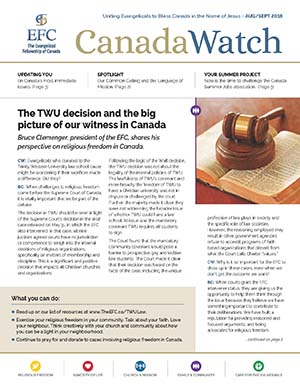Click the download button at the bottom of this page to view the full, four-page PDF.
Bruce Clemenger, president of the EFC, shares his perspective on religious freedom in Canada.
CW: Evangelicals who donated to the Trinity Western University law school cause might be wondering if their sacrifices made a difference. Did they?
BC: When challenges to religious freedom come before the Supreme Court of Canada, it is vitally important that we be part of the debate. 
The decision in TWU should be seen in light of the Supreme Court’s decision in the Wall case released on May 31, in which the EFC also intervened. In that case, all nine justices agreed courts have no jurisdiction or competence to weigh into the internal decisions of religious organizations, specifically on matters of membership and discipline. This is a significant and positive decision that impacts all Christian churches and organizations.
Following the logic of the Wall decision, the TWU decision was not about the legality of the internal policies of TWU. The lawfulness of TWU’s covenant and more broadly the freedom of TWU to have a Christian university was not in dispute or challenged by the court. Further, the majority made it clear they were not addressing the broader issue of whether TWU could have a law school. At issue was the mandatory covenant TWU requires all students to sign.
The Court found that the mandatory community covenant would pose a barrier to prospective gay and lesbian law students. The Court made it clear that their decision was based on the facts of the case, including the unique place the profession of law plays in society and the specific role of law societies. However, the reasoning employed may result in other government agencies refuse to accredit programs of faith based organizations that dissent from what the Court calls Charter “values.”
CW: Why is it so important for the EFC to show up in these cases, even when we don’t get the outcome we want?
BC: When courts grant the EFC intervener status, they are giving us the opportunity to help them think through the issue because they believe we have something important to contribute to their deliberations. We have built a reputation for providing reasoned and focused arguments, and being advocates for religious freedom.
Decisions are focused on the fact of the case. Even when the decision is not what we hoped for, sometimes there are reasons the court uses that may help us in future cases. It is important that we be there, and our donors make that possible for us. It’s a very important part of the work that we do together.
CW: Are you concerned about religious freedom in our country?
BC: This decision is of great concern, particularly since the Federation of Law Societies approved the law school (with only three law societies dissenting), and two of three provincial appeal courts sided with TWU. Some of the arguments made by the majority in reaching their decision are deeply troubling, and we will need to address those in future cases.
We had a unanimous victory with the Wall case, now with TWU a loss in a split decision. We need to be good stewards of the religious freedom we enjoy, and be persistent in its defense. That mandate has not changed with this decision.
CW: What encouragement can you offer local churches and Christian organizations in Canada?
BC: By bearing faithful witness in our communities we are exercising our religious freedom that many Christians in other countries do not have. It is important that we steward our freedom and exercise it. We enjoy the freedom to do what God has called us to do – so let’s do it, and those who are blessed by our witness in word and deed will see the value of religious freedom.
In the end, our task as Christians is to live faithful lives of witness to the gospel. The context within which we witness is changing, and we will continue to face obstacles and challenges as well as discover opportunities and ways for effective witness. We’ve always said that together we are stronger, and that has never been truer.
What you can do
- Read up on our lengthy list of resources at www.TheEFC.ca/TWULaw.
- Exercise your religious freedom in your community. Talk about your faith. Love your neighbour. Think creatively with your church and community about how you can be a light in your neighbourhood.
- Continue to pray for and donate to cases involving religious freedom in Canada.
Also in this issue: Our Common Calling and the language of mission; Now is the time to challenge the Canada Summer Jobs attestation; Join us in the Air Miles program; Updating you on Canada’s most immediate issues; Message from the president; And more.